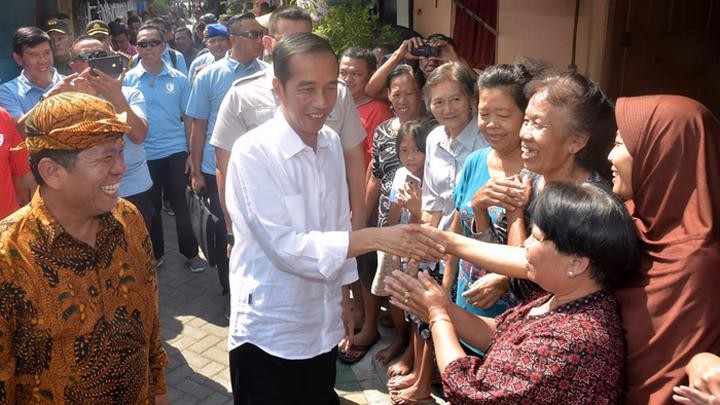Popular Reads
Top Results
Can't find what you're looking for?
View all search resultsPopular Reads
Top Results
Can't find what you're looking for?
View all search resultsSocio-economic gap has closed under Jokowi: INFID
In a report titled “Public Perception of Social Gap 2018” released recently, INFID said Indonesia’s social gap reduction score had improved to 6.6 in 2018 from 6.2 in 2017.
Change text size
Gift Premium Articles
to Anyone
T
he International NGO Forum on Indonesian Development (INFID) has called on the government to continue tackling the gap between the rich and poor by providing more beneficial social service programs in a new report that shows the country’s social gap index improved last year.
In a report titled “Public Perception of Social Gap 2018” released recently, INFID said Indonesia’s social gap reduction score had improved to 6.6 in 2018 from 6.2 in 2017.
“However, the government should provide programs with greater quality to have a higher index,” said INFID researcher Bagus Takwin during the launch of the survey results, which involved 2,040 respondents.
According to the report, the public perceived the 2018 programs as having provided them greater benefits than the programs in 2017.
“They claimed they have obtained welfare support more conveniently and in a more timely fashion,” Bagus said.
In 2017, President Joko “Jokowi” Widodo’s administration set aside more than Rp 67 trillion (US$4.75 billion) from the 2017 budget for social assistance through various programs.
Of the total, Rp 17.30 trillion was earmarked for the Family Hope Program (PKH) cash assistance program, Rp 13.5 trillion for the government’s non-cash food assistance campaign (BPNT), Rp 25.5 trillion for the national health insurance (JKN) program and Rp 10.80 trillion for the Smart Indonesia Card (KIP) program.
The government poured in an additional of Rp 11 trillion to the social programs in 2018. It also shifted the method of disbursement to a cashless transfer system.
Supported by psychologists from the University of Indonesia (UI), INFID conducted a survey of the programs, also including the subsidized rice for the poor program (raskin), skills training center program (BLK) as well as internship programs. The survey was conducted in 34 provinces over three months. It has been conducted every year since 2015.
The public indicated that most programs last year had been beneficial to them, and were well received by those who needed them, the report said.
“However, the level of benefits from skill training centers and internship programs did not increase significantly last year,” Bagus said, adding that employment was one of the biggest factors that helped decrease the social gap.
INFID recommended improvements in several public policies, such as providing unemployment allowances and internship programs.
Bagus said although income was an indicator in the study, authorities should also consider two other factors, people’s purchasing power and access to prosperity, in addressing the social gap. Socio-economic inequality is higher in eastern Indonesia compared to other parts of the country.
“Millennials now receive larger salaries compared to their parents. However, they cannot afford to buy a house,” he said.
President Jokowi, who is running for a second term in office this year, is promoting human capital development as a central theme of this year’s state budget to improve essential services, such as education, health care and basic infrastructure.
He argued that social programs, specifically the PKH program, had improved underprivileged children’s performance at school as well as their families’ well being.
"I am planning to increase the [PKH] program funds from Rp 19.3 trillion to Rp 32.65 trillion [this year]," Jokowi said in Jakarta in January, adding that his administration aimed to ensure the program was implemented properly.
The Family Hope Program funds are disbursed four times a year: in January, April, July and October.
INFID said evaluation of the government’s efforts to tackle the socio-economic gap needed to be more systematic to further enhance the index. (das)










